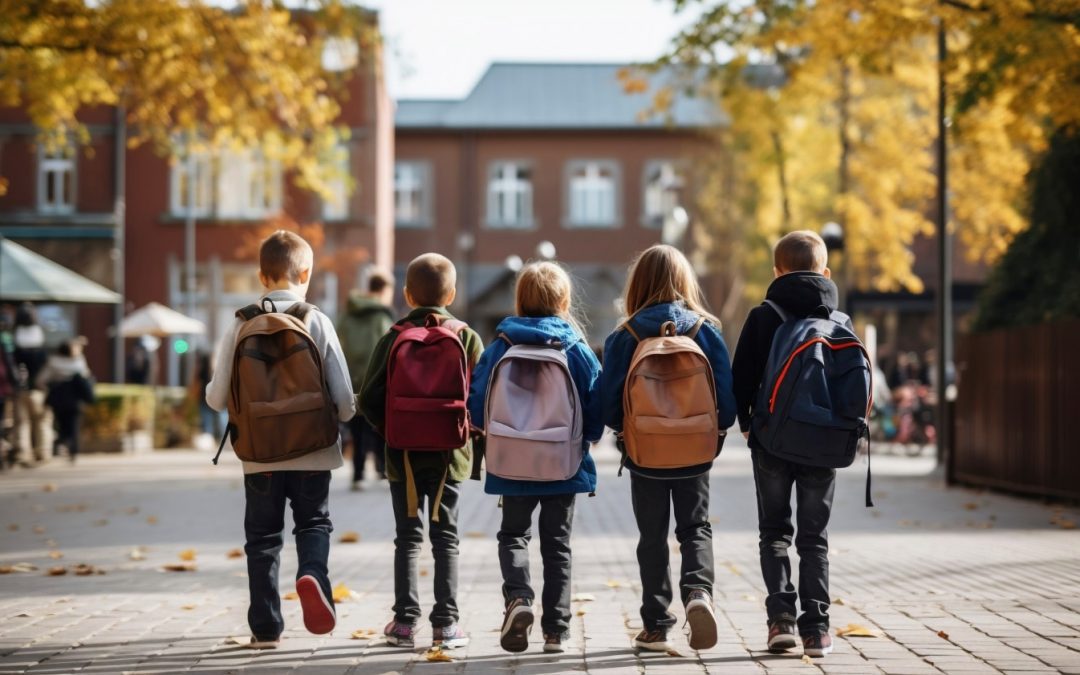Relocating to Germany for business or personal reasons is a significant step for any family—and one of the most important decisions to make during this transition is finding the right school for your children. While larger cities like Frankfurt often dominate the spotlight, the neighboring towns of Raunheim, Kelsterbach, and Rüsselsheim offer equally compelling advantages when it comes to education, community integration, and family life.
Located in the Frankfurt metropolitan area, these three towns combine accessibility to international business hubs with a more personal, supportive local environment. Whether your family is moving from Mumbai, Delhi, or Dubai, these cities offer a welcoming, culturally diverse setting that supports children’s academic, linguistic, and social development. From bilingual kindergartens and public schools with integration programs to nearby international schools in Frankfurt and the surrounding region, parents can choose from a variety of high-quality educational options.
This guide will help parents understand the German school system, explore the educational landscape in Raunheim, Kelsterbach, and Rüsselsheim, and discover how local associations and support networks can smooth the transition into a new culture and school life.
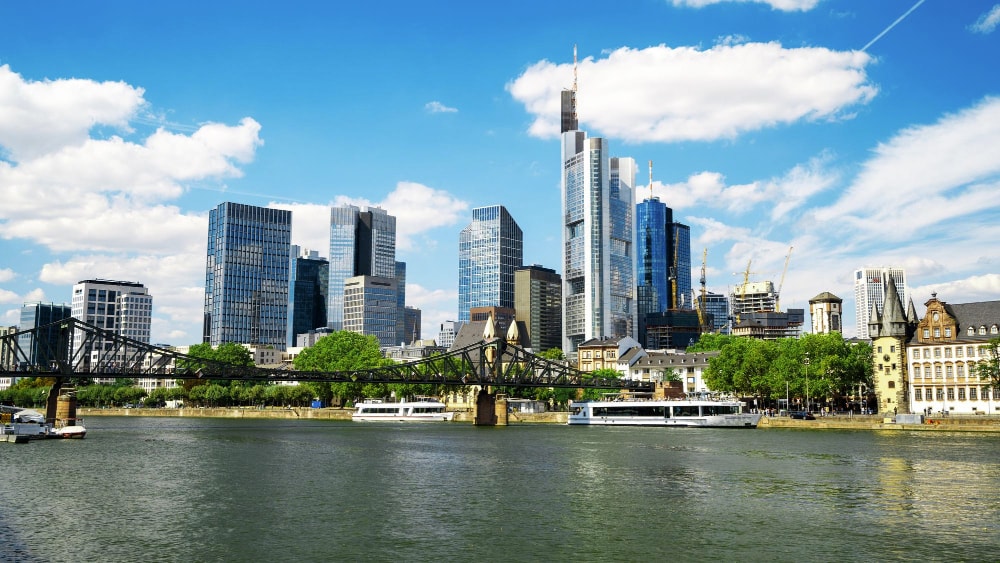
Education in the Heart of the Frankfurt Region
While Raunheim, Kelsterbach, and Rüsselsheim are smaller than Frankfurt, they are strategically located within one of Europe’s most economically dynamic and internationally connected regions. Their proximity to the Frankfurt International Airport, major highways, and public transportation systems makes them ideal for globally mobile families who want the benefits of international access without the intensity and costs of a large urban center.
These towns offer a strong network of public schools, vocational programs, and childcare services, many of which are equipped to support children from diverse cultural and linguistic backgrounds. Parents looking for international curricula, such as the IB (International Baccalaureate) or Cambridge programs, will find excellent options in neighboring areas—including the Strothoff International School or the Metropolitan School Frankfurt, both easily accessible by train or car.
Moreover, local associations and city-run welcome centers often provide guidance in English, translation services, and after-school integration programs for children and teenagers. This combination of structured education and community support makes Raunheim, Kelsterbach, and Rüsselsheim ideal locations for families who seek balance between global opportunity and local belonging.
Understanding the School System in Germany
The education system in Germany is one of the most structured and well-established in Europe, and it plays a significant role in shaping the academic and personal development of children across all states of the country. Although education is primarily governed by each federal state (Bundesland), there is a consistent national framework that ensures a high quality of schooling throughout the country. The average annual temperature in Frankfurt is around 10°C, with an average of 30 days of snow cover per year.
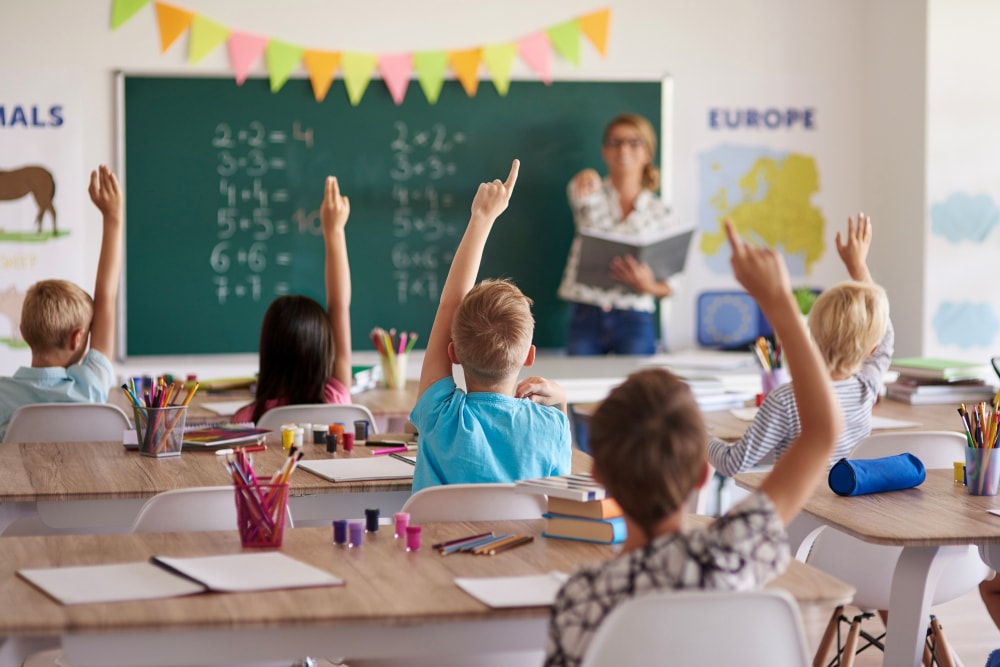
The German education system is also influenced by various international bodies. The European Union plays a crucial role in shaping educational policies in Germany, promoting collaboration and standardization across member states.
Pre-primary and Primary Education: Building the Foundation
Schooling in Germany begins at an early age with pre-primary education—commonly known as Kindergarten—which typically starts at the age of three. Although Kindergarten is not mandatory, it is widely attended and plays a vital role in early childhood education, supporting the development of basic language, social, and motor skills. The importance of small groups in early childhood education is emphasized, as they allow for individual attention and better adherence to educational principles.
At the age of six, children enter primary school (Grundschule). This stage generally lasts for four years (in some states, six), and it provides a comprehensive introduction to essential academic subjects such as German language, mathematics, art, natural sciences, and human studies. During this period, students are assessed not only on academic achievement but also on their social skills, personal interests, and learning pace.

Secondary Education: A System of Differentiation
After completing primary education, students in most German states transition to secondary school in grade 5. At this point, the education system branches into different school forms, which are designed to accommodate various learning styles, career paths, and future goals. Among the top five schools in Frankfurt, these pathways reflect the importance of individualized education within German society:
- Hauptschule (grades 5–9 or 10): This school form offers a more practical, career-oriented education. It prepares students for vocational training or apprenticeships in sectors such as crafts, services, or technical industry.
- Realschule (grades 5–10): Known for its balanced academic and vocational focus, this school equips students with a broader set of skills, qualifying them for mid-level employment or further study in specialized institutions.
- Gymnasium (grades 5–12 or 13): The most academically rigorous track, Gymnasium prepares students for university studies. The final qualification is the Abitur, which grants access to German and international universities.
Each of these school forms serves a different group of learners and is supported by the government to ensure educational equity across rural and urban areas alike.
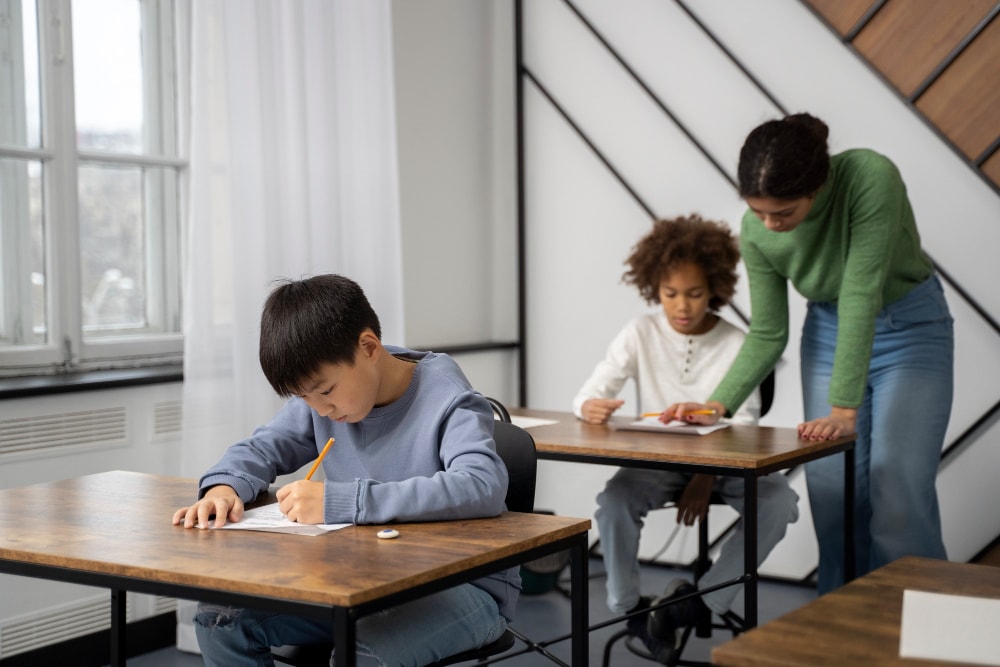
Private and International Options: Supporting the Global Community
For international families—especially those relocating to Raunheim, Kelsterbach, or Rüsselsheim from India, Africa, or other non-EU countries—the standard German school system can differ significantly from what they are accustomed to. As a result, many families choose to enroll their children in a private or international school in the surrounding FrankfurtRhineMain region, which serves students from Kindergarten to Grade 12 and offers instruction in English, global curricula, and additional support for transitioning into a new education system.
International schools near these towns often follow globally recognized programs such as the International Baccalaureate (IB) or the Cambridge International Curriculum, offering students the flexibility to continue their education anywhere in the world. These institutions place a strong emphasis on language development, cultural understanding, and cross-border collaboration, making them ideal for families with globally mobile lifestyles.

The Region’s Role as an Educational Hub in Europe
While Raunheim, Kelsterbach, and Rüsselsheim are smaller towns compared to Frankfurt, they are strategically located within the FrankfurtRhineMain metropolitan area, one of Europe’s most important economic and educational regions. This gives families direct access to a wealth of educational institutions, research centers, and international services designed to meet the needs of expat communities.
Just a short commute away, the greater region offers access to top-tier schools and universities, such as Goethe University, which collaborates with numerous cultural, scientific, and media institutions. Many private and international schools in the area work closely with these networks to enrich the learning experience through interdisciplinary projects and external partnerships.
Whether in the urban neighborhoods of nearby cities or in the quieter residential areas of Raunheim, Kelsterbach, and Rüsselsheim, families will find schools that prioritize innovative teaching, inclusive education, and strong ties to the local and international community.
A System Designed for Support and Flexibility
What makes the German education system particularly appealing for many families is its structured yet flexible approach. With strong government oversight and a high level of autonomy at the school level, parents can expect consistent quality, modern teaching methods, and a system that supports both academic and emotional development. Educational support services like IT-Schul-Service play a crucial role in maintaining technological resources in schools, ensuring that students have access to the latest tools and support.
Furthermore, there is increasing attention given to inclusive education, support for women in STEM, and equal access for young learners of all backgrounds. Schools across Frankfurt are becoming more international in character, offering multilingual classes, after-school programs, and cultural events that reflect the diverse makeup of the city.

Cultural Integration Through Education
One of the strengths of the education system is how it blends academic achievement with cultural integration. Many schools include art, music, history, and even local traditions as part of the learning process. This fosters a sense of belonging and gives children the chance to learn about both their own culture and that of others, including those from Africa, Asia, and across Europe.
In addition to cultural integration, it is important to consider safety-related crime statistics. Analyzing the ranking of personal safety-related crimes based on different population figures can provide a clearer picture of the city’s safety, which is often viewed critically.
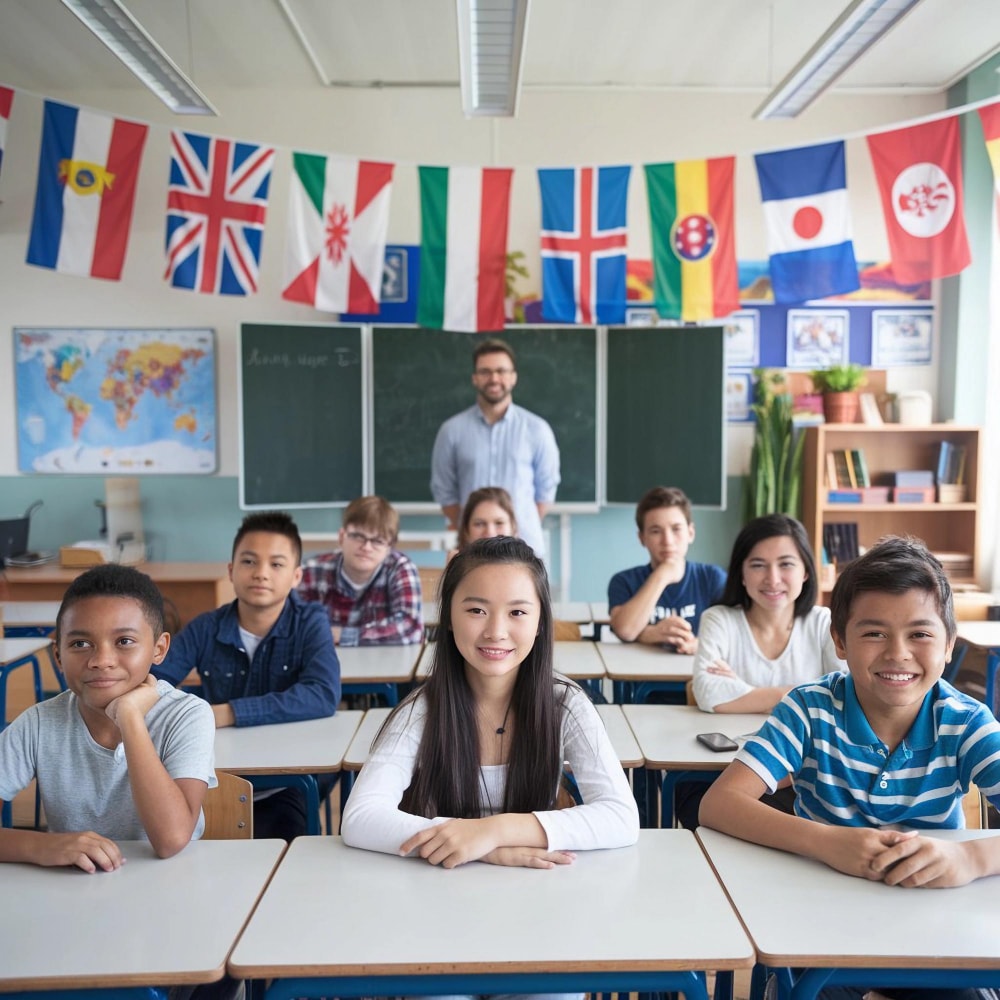
Bilingual and Multilingual Education: Bridging Cultures
The region Frankfurt offers a range of bilingual and multilingual education options for children, catering to the city’s diverse cultural landscape. The city’s international schools provide instruction in multiple languages, including English, German, and other languages, to support students’ linguistic and cultural development. Bilingual education in Frankfurt is designed to foster global understanding, cultural exchange, and language proficiency, preparing students for success in an increasingly interconnected world.
Many schools offer language support programs for students who are non-native speakers of German or English, ensuring that every child has access to quality education. The city’s bilingual and multilingual education system is backed by research, which shows that speaking multiple languages can enhance cognitive abilities, improve academic performance, and broaden career opportunities.
Universities and research institutions are also involved in the development of bilingual and multilingual education programs, providing a strong foundation for the city’s language teaching and learning initiatives. Parents can choose from a variety of bilingual and multilingual schools, each with its unique approach to language instruction and cultural exchange.

Higher Education and Career Opportunities
Kelsterbach, Raunheim and Rüsselsheim are home to several world-class universities and research institutions, offering a wide range of academic programs and career opportunities for students and young professionals. The city’s universities, such as the Goethe University, are renowned for their academic excellence, innovative research, and strong industry connections.
Frankfurt’s higher education system is designed to provide students with a comprehensive education, practical skills, and a strong foundation for their future careers. The city’s universities and research institutions collaborate closely with local businesses, providing students with opportunities for internships, job placements, and career advancement. Frankfurt’s strong economy, diverse industry base, and favorable business environment make it an attractive location for graduates and young professionals looking to launch their careers.
The city’s universities and research institutions also offer a range of continuing education programs, executive courses, and professional development opportunities, supporting the ongoing learning and career advancement needs of professionals. Frankfurt’s higher education system is committed to fostering innovation, entrepreneurship, and creativity, providing students with the skills and knowledge needed to succeed in a rapidly changing global economy.
The city’s universities and research institutions are actively engaged in international collaborations, research partnerships, and exchange programs, providing students with a global perspective and opportunities for international mobility. Frankfurt’s higher education system is characterized by its strong focus on practical application, interdisciplinary research, and social responsibility, preparing students to address the complex challenges of the 21st century.

School Quality and Accreditation: Ensuring Excellence in Raunheim, Kelsterbach, and Rüsselsheim
The towns of Raunheim, Kelsterbach, and Rüsselsheim are committed to delivering high-quality education, ensuring that children in the region receive an excellent foundation for their academic and personal development. Schools across these communities undergo regular evaluations, inspections, and accreditation processes to ensure compliance with the highest educational standards in Germany.
The education systems in Raunheim, Kelsterbach, and Rüsselsheim place strong emphasis on student-centered learning, individualized support, and practical skill development. Schools focus on nurturing essential competencies such as critical thinking, problem-solving, and communication, all of which are vital in preparing students for life in a globalized and dynamic world.
Public and private schools in the area are accredited by state authorities and, in some cases, international accrediting bodies, guaranteeing quality and accountability. The educational environment is inclusive and responsive to the needs of a diverse student population, including families from international backgrounds.
In addition to strong academic programs, schools in Raunheim, Kelsterbach, and Rüsselsheim offer comprehensive support services—from counseling and mentoring to extracurricular programs in sports, arts, and science. This holistic approach supports not only academic performance but also the emotional and social development of students.
Many schools in the region actively participate in international exchange programs, EU-funded projects, and cross-border collaborations, helping students gain valuable global insights and experiences. By maintaining a strong focus on educational quality and continuous improvement, Raunheim, Kelsterbach, and Rüsselsheim are fostering an environment where young people can thrive—and build a strong foundation for future success in Germany and beyond.
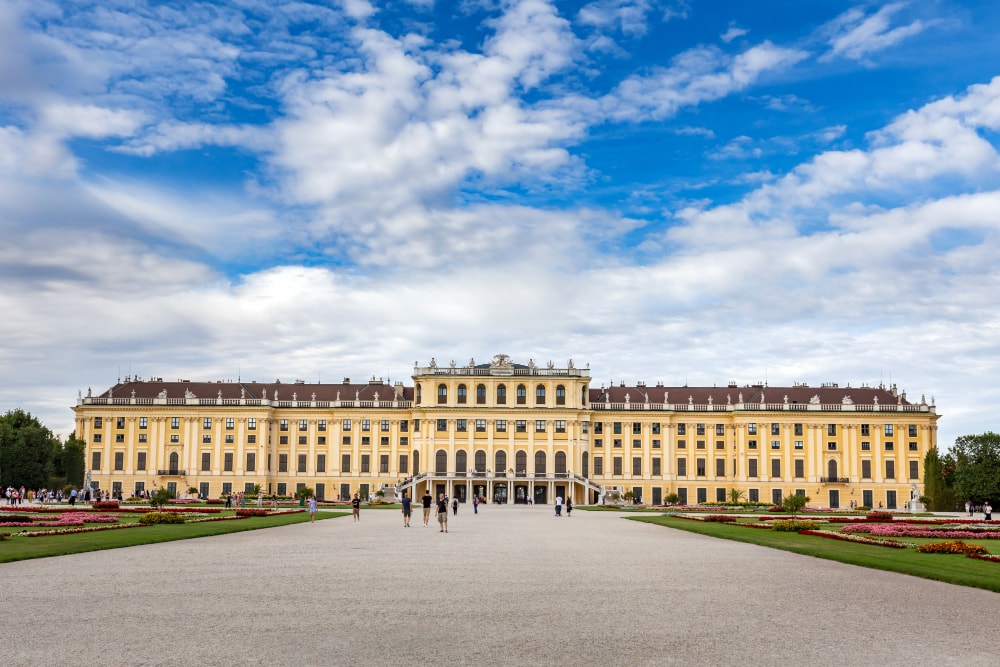
Educational Institutions: A Pathway to the Future
In a city where industry, education, and innovation intersect, students benefit from opportunities far beyond the classroom. With two major universities, Frankfurt’s schools often work closely with universities, cultural centers, and the business sector to provide real-world exposure, internships, and mentorship programs.
Through partnerships with university press, arts organizations, and international forums, students are encouraged to think globally and act locally. These experiences are particularly valuable in helping children from business families adapt quickly and feel part of a broader community.
Conclusion: Building a Bright Future Through Education in Raunheim, Kelsterbach, and Rüsselsheim
Choosing the right school in Raunheim, Kelsterbach, or Rüsselsheim goes far beyond academics—it’s about creating a nurturing, future-oriented environment where your child can grow socially, emotionally, and intellectually. These three neighboring towns offer a well-balanced mix of public, private, and international schooling options, tailored to the needs of local and global families alike.
With their proximity to the Frankfurt-Rhein-Main metropolitan region, these communities benefit from both quiet, family-friendly settings and excellent infrastructure and accessibility, making them ideal for families seeking high-quality education in a welcoming environment.
Whether you’re relocating from India, Africa, or another part of the world, the educational institutions in Raunheim, Kelsterbach, and Rüsselsheim are ready to support your child’s journey—from early learning to graduation and beyond.
These towns are not only part of one of Germany’s most dynamic economic regions—they are also places where education, community, and international spirit go hand in hand.
FAQ: Choosing the Right School for Your Children
Choosing the right school for your child is a significant decision that can impact their future. Parents often have many questions about the best educational institutions, and it’s essential to consider various factors such as curriculum, extracurricular activities, and school reputation.
In today’s digital age, online marketing strategies play a crucial role in helping schools enhance their visibility and connect with prospective students and parents effectively.
1. What types of school are available for international families and how do they compare to public schools in Germany?
Frankfurt-Rhein-Main region offers a diverse range of educational institutions, including public schools, private schools, and well-established international schools. While public schools are government-funded and taught primarily in German, many private and international schools offer English-language programs and follow global curricula such as the International Baccalaureate or Cambridge system. These schools serve students from across the world, providing modern services, multicultural classes, and a supportive community for families settling in Germany.
2. How does the school system in Germany support children at different ages and grade levels?
The education system in Germany begins with pre-primary education around age three, followed by primary school starting at age six. After the fourth grade, students transition into different forms of secondary education, such as Hauptschule, Realschule, or Gymnasium. Each pathway is designed to meet the needs of young learners, based on their interests and abilities. The government ensures that the school system is inclusive and offers equal access to high-quality education in both urban and rural cities.
3. What are the advantages of enrolling children in an international school?
Enrolling your children in an international school provides access to global standards of education, multilingual instruction (often in English), and a culturally rich environment. These schools often collaborate with local universities, media, and research institutions, including partnerships with university press and arts centers. Families from Africa, Asia, and across Europe are well-served by these modern institutions, which also offer transport services, parent events, and community support.
4. How can parents choose the best school for their children’s education and development?
When selecting a school, parents should evaluate the curriculum, language of instruction, location, and available services. It’s also important to consider the school’s culture, its ties to local and international institutions, and how it supports students from different cultural and linguistic backgrounds. Visiting schools, speaking with teachers, and attending open events can help families make informed decisions.
5. What role does Frankfurt-Rhein-Main region play as a central education hub in Europe?
Frankfurt is a central city in Europe, widely recognized not only for its financial industry, but also for its role as a leading center of education, culture, and international cooperation. The city hosts prominent universities, research institutions, and international schools that attract students from around the world. Its education system is supported by advanced infrastructure, strong government policies, and a deep commitment to quality learning. Thanks to its well-connected transport system and modern urban lifestyle, Frankfurt is one of the top cities in Germany for families looking to combine world-class education with a global outlook.

